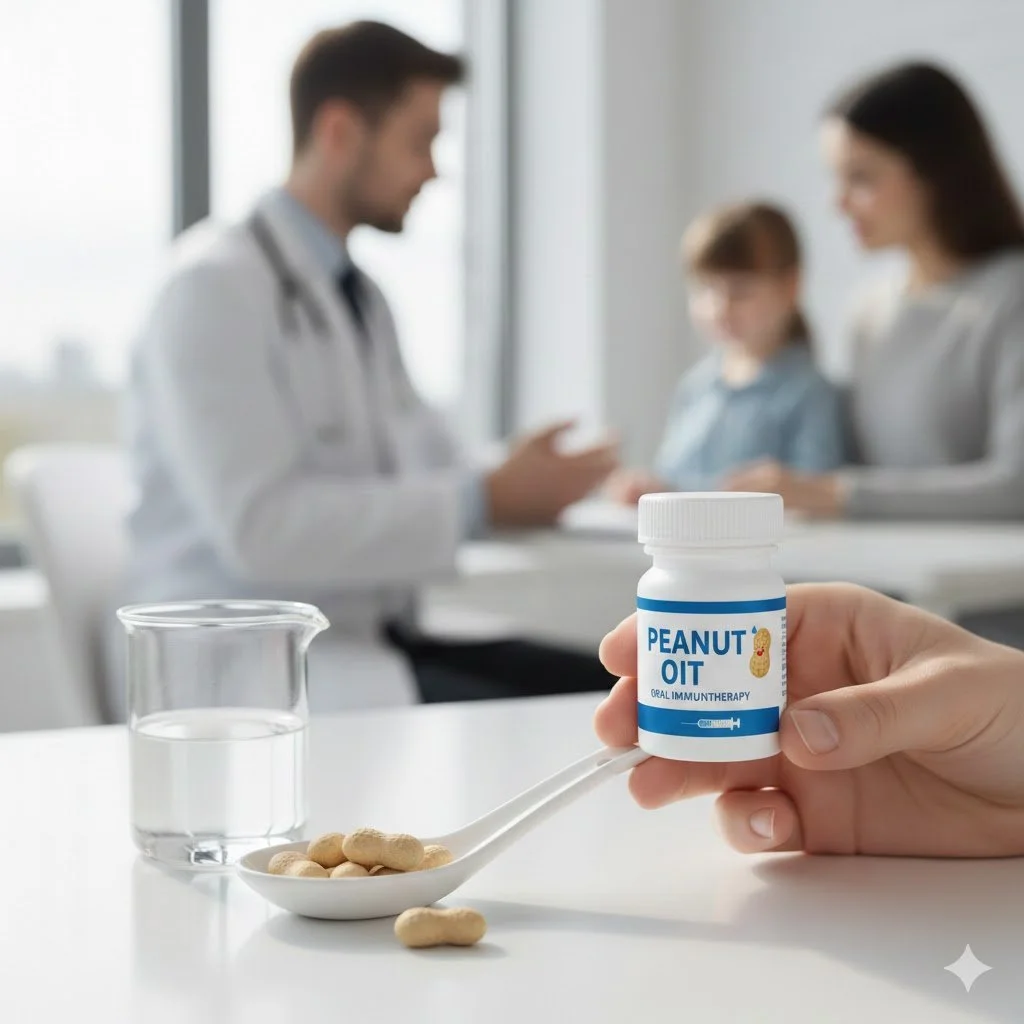EurNeffy (aka Neffy) Nasal Spray - available in the UK
Anaphylaxis, a severe and potentially life-threatening allergic reaction, traditionally requires immediate intramuscular injection of adrenaline using an Adrenaline Auto-Injector (AAI).
Recently approved by both the FDA and EMA, Neffy nasal spray (also known as Eurneffy in Europe) offers an innovative, needle-free alternative.
The device is now available on the NHS. We can also script this privately in our Allergy Centre of Excellence (ACE) pharmacy.
At present, in the UK, only the 2mg dose (Body Weight >30kg) is available. Hopefully, we will have access to the 1mg dose in 2026.
Neffy assists significantly with anaphylaxis treatment.
What is EurNeffy?
Neffy is a novel, nasal-delivered adrenaline device designed specifically for individuals experiencing anaphylactic reactions.
Developed by ARS Pharmaceuticals, this needle-free nasal spray represents a significant advancement over traditional AAIs.
EurNeffy (adrenaline/epinephrine) is indicated for the emergency treatment of type I allergic reactions, including anaphylaxis, in adults and pediatric patients.
Licenses in different countries will vary. Currently approved in the UK for individuals weighing at least 30kg (typically around 10 years of age), a lower-dose (1mg) version for patients weighing 15kg and above is anticipated.
Advantages of EurNeffy Nasal Spray Over Traditional AAIs
Needle-Free Administration
One of Neffy’s most significant benefits is eliminating the anxiety and discomfort associated with needle injections. This makes Neffy especially valuable for children and individuals with needle phobia, enhancing compliance and confidence in managing allergic emergencies.
Ease of Use
Neffy’s nasal spray device is intuitively designed for rapid, uncomplicated administration. This user-friendly feature enables quick action during stressful allergic episodes, significantly reducing delays in administering life-saving adrenaline.
Shelf-life, Portability and Stability
Neffy’s compact nasal spray device is easier to carry and manage compared to traditional, sometimes bulky AAI devices.
Importantly. Neffy is expected to have an extended shelf life and greater stability even after exposure to higher environmental temperatures, addressing common concerns related to the storage and efficacy of AAIs.
How Does Adrenaline via EurNeffy Work?
Adrenaline (epinephrine) is a hormone naturally produced by the body. During anaphylaxis, administering adrenaline rapidly counteracts severe symptoms by:
Increasing heart rate and blood flow
Improving heart muscle contractions
Opening the airways
Reducing swelling and hives
It may help stabilise effector cells such as mast cells and basophils, hence earlier administration is recommended.
Neffy delivers adrenaline via nasal absorption, quickly entering the bloodstream to produce systemic effects comparable to those of traditional intramuscular injections.
Clinical Evidence Supporting EurNeffy’s Efficacy
Neffy’s approval by regulatory bodies such as the FDA and EMA was based on robust clinical data.
Neffy’s approval is based on clinical pharmacology studies demonstrating that the pharmacokinetic (PK) and pharmacodynamic (PD) profiles of Neffy are comparable to those of established intramuscular epinephrine injection products, such as EpiPen, with similar systemic exposure and hemodynamic responses (pulse rate and systolic blood pressure) in both healthy adults and patients with type I allergy.
A phase 1 crossover study in healthy subjects showed that Neffy 2 mg produced peak plasma epinephrine levels bracketed by those of EpiPen and manual IM injection, and resulted in comparable or greater increases in pharmacodynamic parameters (pulse rate, blood pressure) relative to injection products. In pediatric patients (4–17 years, ≥15 kg), a single dose of Neffy (1 mg for 15–<30 kg, 2 mg for ≥30 kg) produced PK/PD responses within the adult range, supporting extrapolation of efficacy to this population.
A phase 3 open-label study in pediatric food allergy patients demonstrated that Neffy successfully treated oral food challenge–induced anaphylaxis symptoms, with a median symptom resolution time of 16 minutes and no need for a second dose in the initial reaction. Adverse events were consistent with known epinephrine effects, including tremor and nasal erythema.
The FDA label specifies dosing as one spray of Neffy 2 mg for patients ≥30 kg and one spray of Neffy 1 mg for patients 15–<30 kg, with a second dose permitted after 5 minutes if symptoms persist. The safety and effectiveness in patients <4 years or <15 kg have not been established.
How to Administer EurNeffy Nasal Spray
Neffy is administered through the nostril. Aim for the forehead (this is a more straightforward technique than that required for hayfever nasal sprays).
If symptoms persist or worsen after the first dose, a second dose may be administered in the same nostril, contrary to standard AAI guidance, which recommends alternating injection sites.
The device need not be ‘primed’ (or a dose may be lost).
If this is your first time exploring allergy treatments for your child, consider consulting a paediatric allergy specialist in London to create a personalised care plan.
Potential Side Effects of EurNeffy
Like all medical treatments, Neffy has associated side effects, although they are typically mild and short-lived. Common side effects include:
Nasal irritation, itchiness, or congestion (nasal stinging is reported as the most common side effect)
Throat irritation
Headache or dizziness
Fatigue or jitteriness (as expected with adrenaline)
Abdominal discomfort or nausea
Sneezing or a runny nose
Despite these side effects, the benefits of rapid adrenaline delivery during anaphylaxis substantially outweigh any temporary discomfort.
Availability of EurNeffy in the UK
Currently, Neffy nasal spray has regulatory approval from both the FDA and EMA. It is being disseminated to the NHS UK market.
Patients can decide with their HCP which device they prefer to carry.
Managing Allergies Beyond EurNeffy
While Neffy offers an exciting new treatment option, long-term allergy management is essential. Regular allergy reviews, specialist follow-ups, and proactive care strategies such as oral immunotherapy can improve quality of life and reduce allergic reactivity over time.
Parents managing multiple allergies may find these guides helpful:
For an even broader overview, the London Allergies blog covers common conditions, triggers, and treatment advancements.
Conclusion
Neffy nasal spray represents a significant step forward in allergy emergency care, offering a needle-free and easy-to-use alternative for treating anaphylaxis.
With comparable effectiveness to traditional auto-injectors and added convenience for everyday use, it holds particular promise for children, schools, and individuals managing severe allergies.
While its NHS rollout is still pending, understanding how Neffy fits into your broader allergy treatment plans is vital.
Until it becomes widely available in the UK, ongoing support through allergy testing, specialist appointments, and personalised treatment strategies remains essential.
For those seeking up-to-date information or tailored care, London Allergy Consultants continues to provide trusted guidance for every stage of allergy management.
Frequently Asked Questions
-
EurNeffy is expected to be available in the UK market late 2025, subject to NHS approval and regulatory integration.
-
Yes, children weighing at least 30kg (approximately 10 years and older) can use the currently approved 2mg dose.
A 1mg dose suitable for younger children is also anticipated later in the year.
-
Clinical trials indicate that EurNeffy achieves comparable adrenaline blood levels and physiological effects as traditional AAI’s.
Data from clinic challenge settings suggest equivalent efficacy to that achieved with AAI, i.e., a single dose of adrenaline (regardless of whether this is given IMI or via the nasal route) will be effective. In 10% of cases, a second dose of adrenaline is required.
-
No, EurNeffy provides a reliable alternative for suitable individuals, but traditional AAIs will remain essential, especially for children weighing under 30kg or patients unable to use a nasal administered product, such as those with nasal polyps, atresia, or neurodiversity.
Worried About Allergies? Let’s Help You Get Answers
If your child is showing signs of a food, pollen, or skin allergy, early diagnosis is key. At London Allergy Consultants, our expert team provides trusted, evidence-based care tailored to your child’s needs. From testing to treatment plans, we guide you every step of the way. We are happy to assess babies (infants), toddlers, young children, adolescents and young adults with allergies.
London Allergy Consultants
London Allergy Consultants is a leading UK centre for diagnosing and treating food and airborne allergies in children and young people.






Sesame Oral Immunotherapy (OIT) has emerged as a Sesame Oral Immunotherapy (OIT) has become a medical therapy for children with severe sesame allergies. Unlike simple avoidance, OIT aims to retrain the immune system by allowing the regular, supervised consumption of small amounts of sesame protein.